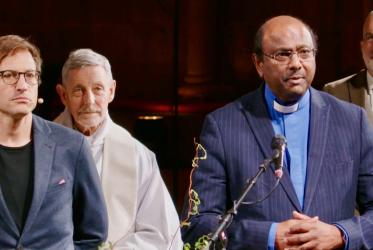As more and more people in the Philippines lose their loved ones to extrajudicial killings, and are falsely accused of crimes by the authorities, the World Council of Churches (WCC) is increasing its support and accompaniment of people fighting for human rights in the Philippines.
On 16 September, concerned colleagues and guests gathered in the Ecumenical Centre in Geneva to attend an event entitled: “Defending the Sanctity of Life and Dignity of Creation: The Human Rights Situation in the Philippines”. The event gave a platform to four different speakers from victim, human rights and church perspectives.
Moderator Peter Prove, director of the WCC Commission of the Churches on International Affairs (CCIA), highlighted the importance of the United Nations Human Rights Council resolution on the Philippines led by the government of Iceland in July, which mandates an investigation on the human rights situation in the country
Two short videos, “War on Drugs: Ang Pagbangon (Rising Up)” and “Defend Negros”, denounced the war against the poor and the massacres of farmers and Indigenous people, carried out under cover of the so-called ‘war on drugs’ and of the government response to armed insurgencies.
Marissa Lazaro gave a heart-wrenching testimony about the loss of her youngest son Chris. Considered “collateral damage,” he was shot by the police with three other men who were accused of being drug addicts and robbers. She was told that he was shot because had “fought back”, but evidence that he had been handcuffed at the time that he was killed by a fusillade of 9 bullets casts serious doubt on that claim. As she did not have any direct witness or money for a lawyer she could not make a claim for justice, so she volunteered with a civil society group ‘Rising Up’ in order to raise her voice on behalf of all those who have suffered similar tragedies and injustices. Lazaro concluded: “I don’t know what will happen to me when I will be back to the Philippines because they saw me on the news.”
Cristina Palabay, general secretary of Karapatan, a leading human rights organization in the Philippines, denounced the actions of Philippine president Rodrigo Roa Duterte’s administration concerning the ‘war on drugs’ and his attacks against human rights defenders. Palabay explained: “It’s because of a policy. It comes from the president himself. Drug addicts and drug dealers are not considered as humans”.
Rev. Antonio N. Ablon, bishop of the Diocese of Pagadian of the Iglesia Filipina Independiente, shared his and his church’s work to defend the rights of the Lumad, Indigenous People from the Mindanao region, who are being pushed away from their resource-rich ancestral lands. Ablon has been vilified, ‘red-tagged’ and threatened by state police and paramilitary groups.
Budi Tjahjono, from Franciscans International, was part of the WCC Pilgrim Team Visit to the Philippines in August. He criticized the rise of an authoritarian regime in the Philippines: “The government is really trying to eliminate the poor”.
Very similar testimonies and concerns were shared in a WCC-sponsored side event in the United Nations in Geneva on Tuesday 17 September, associated with the current session of the UN Human Rights Council. Following the testimony shared by Marissa Lazaro at this event, CCIA Director Prove remarked: “If we extrapolate Marissa’s personal testimony to the hundreds and thousands of others similarly affected, we gain a small insight into the enormity of the suffering in the Philippines today.”
Pilgrim Team visits Philippines, amplifies call for human rights- WCC press release 22 August 2019
At Human Rights Council, WCC advocates for human dignity - WCC press release 16 July 2019
WCC condemns massacre of farmers in Philippines - WCC press release 12 April 2019








